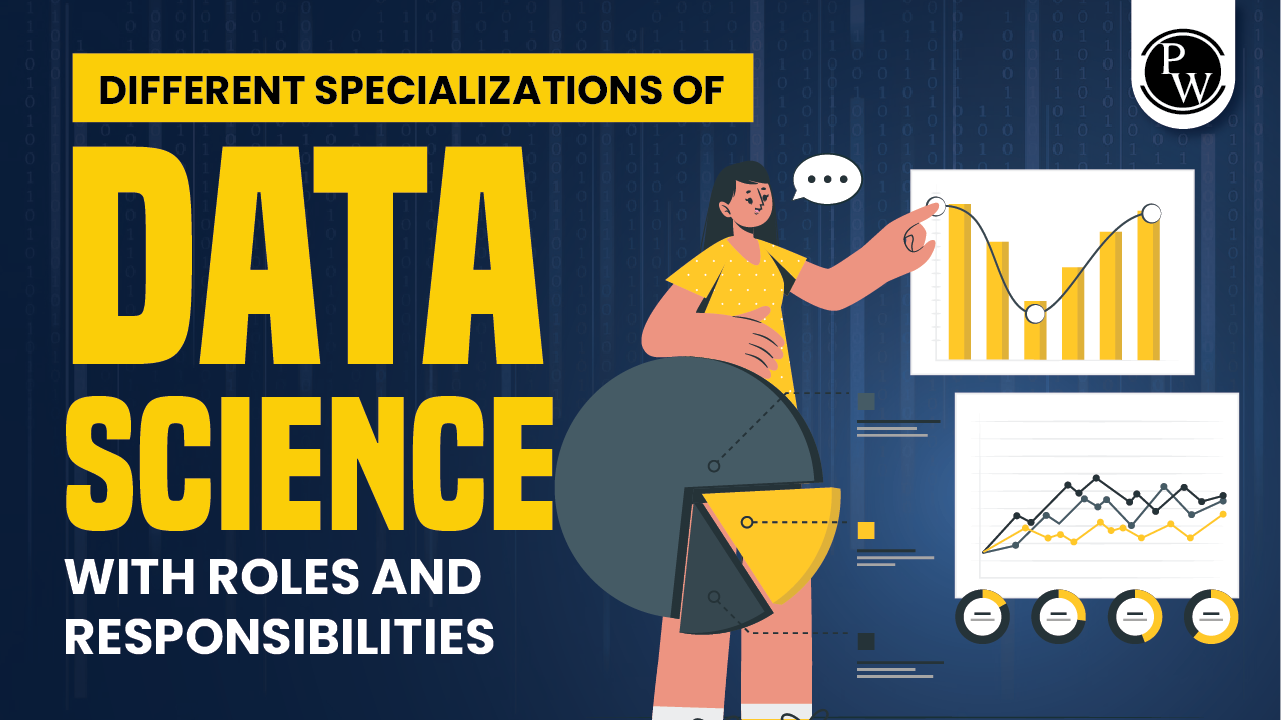Data Science has become a trendy career choice among the youth nowadays. This field is used in various industries like research, engineering, cybersecurity, analytics, marketing, etc. Also, because of this, there is a high demand for professionals with specialized knowledge in the data science field.
People with Data Science Specializations in various fields get the chance to create algorithms and use tools to handle large amounts of data effectively. This field offers many exciting career opportunities, with data scientists being one of the most important roles in this area.
This article will explore different data science specializations within data science that can lead to promising career growth. Data science is growing rapidly, and the market is expected to be worth $25.94 billion by 2026. As a reason for this growth, many companies are looking for data professionals and offering competitive salaries to attract the best talent.
Data scientists and other specialists in this field are closely related to computer scientists. However, there are some domains within data science that professionals can select from by enrolling in specialized courses to find a particular area they are interested in and obtain higher-paying jobs.
People in data science earn around 10.5 LPA on average, with some making up to 25.3 LPA. These figures can go even higher with more experience and a diverse skill set.
Data science has many different areas to explore based on your interests. Some popular domains in data science include Data Mining, Cloud computing, Data Visualization, and Data Analytics. As a student in this field, you can decide which domain suits you best and focus on learning and mastering that area.
Different Types of Data Science Specialization In 2023
With the rapid advancement in technological fields, Data Science Specialization is in high demand in almost all sectors. There are many data science fields that businesses of almost any type can use to enhance and improve their work quality and efficiency.
Recommended Course
- Decode DSA with C++
- Full Stack Data Science Pro Course
- Java For Cloud Course
- Full Stack Web Development Course
- Data Analytics Course
Data Engineering and Warehousing
Data is crucial for successful Data Science Specialization projects. A Data Science team Data Engineer is responsible for managing and organizing the data. They focus on building and maintaining a data warehouse, which involves preparing structured and unstructured data for the Analytics team to create models.
The main job of a Data Engineer is to collect and process data from different sources using pipelines. They are skilled in programming languages like Python, SQL, Scala and tools like Hadoop and Spark. They must also know about ETL (Extract, Transform, and Load) processes.
Data engineers frequently use NoSQL databases in their data pipelines and Hadoop data lakes. They support both batch processing and real-time operations thanks to the Lambda design they use.
Regarding career options, Data Engineers can choose paths like Database developers or continue to specialize as Data Engineers.
Role: Data Engineer
Skills:
- Data collection and storage optimization
- Data processing,
- ETL (Extract, Transform, Load)
- Programming languages (Python, SQL, Scala)
- Big Data technologies like Hadoop, Spark, No-SQL databases, and Lambda architecture.
Career Options:
- Computer Networks Analyst
- Computer Systems Analyst
- Data Analyst
- Data Scientist
- Data Engineer
- Data Manager
Data Mining
Data mining is a way of digging into data to find valuable information that can help a company make smart decisions. It helps uncover hidden patterns and connections in the data. Data mining can provide various useful data structures, depending on what a company needs.
It helps provide an analysis of fraud and risk in finance. It can also examine the production process for product quality and safety. The methods of Path Analysis, Forecasting, and Clustering are a few examples of data mining techniques.
Role: Data Mining Analyst/ Data Analyst
Skills:
- Statistics
- Data analysis
- Machine learning algorithms
- Data modeling
- Computational statistics.
Career Options:
- Data Analyst
- Marketing Analyst
- Data Mining Analyst
- Quantitative Analyst
Database Management and Administration
Database administration and management involve handling digital information storage and retrieval. Installing, configuring, and maintaining database systems is the domain of experts. This study area, a part of data science, opens doors to jobs requiring database management skills.
Database administrators are responsible for designing, integrating, and ensuring the performance of their systems. Those focusing on data security elements of database administration can contribute to cybersecurity and related fields.
Companies need to check their data for accuracy since it keeps changing regularly. Having accurate and detailed information helps companies make timely strategic decisions and stay organized.
This information is used for analysis and reporting, and relational databases make it accessible to those in higher organizational positions. They also ensure that the data is linked together, enabling ongoing updates and that management can easily find data, thanks to their organization.
Role: Database Administrator
Skills:
- Database design and management
- Business intelligence
- Big data systems engineering
- Data warehousing
- Advanced architecture design.
Career Options:
- Information Modeling Engineer
- Data Administrator
- Database Architect.
Deep Learning
Deep learning is a type of machine learning that makes computers smarter without the direct involvement of the human workforce. It uses data and statistics to improve its performance.
It is an essential component of artificial intelligence, and deep learning data science specialization can lead to more employment opportunities in various industries, including retail, manufacturing, hospitality, and healthcare.
Artificial neural networks are used in deep learning, like algorithms replicating human thinking. However, these systems need a lot of data and powerful computers to work well. TensorFlow, Keras, and PyTorch are the most popular deep-learning tools.
Role: Deep Learning Engineer, Research Scientist
Skills:
- Algebra
- Programming
- Data Engineering
- Machine learning
- Deep learning algorithms
- Deep learning frameworks.
Career Options:
- Research Analyst
- Data Analyst
- Research Scientist
- Robotics Engineer.
Natural Language Processing (NLP)
The ability of a computer to understand human language, whether spoken or written, is known as Natural Language Processing (NLP). It is part of artificial intelligence and has been in development for almost 50 years.
It has many practical applications, like in medical research, search engines, and business intelligence. It allows computers to understand and make sense of real-world data using spoken or written language.
This processing converts the data into a code that the computer can understand. NLP enables computers to understand human language similarly to how we do.
Role: NLP Engineer or Researcher
Skills:
- Statistical analysis
- Machine learning
- Deep learning
- Text representation
- Algorithm analysis
- Programming languages.
Career Options:
- NLP Researcher
- NLP Analyst
- NLP Engineer.
Data Visualization
Data visualization is a significant field of Data Science Specialization which means showing information and data in pictures and graphics. It is a technique for using visual representations to make large amounts of data simpler to comprehend.
As humans, we are naturally drawn to colors and patterns. We can quickly recognize differences like red and blue or shapes like squares and circles. Visuals, like art and entertainment, are everywhere in our lives.
Data visualization works the same way, grabbing our attention and helping us spot patterns and anomalies in data easily. It resembles using pictures to tell a story. An effective visual representation’s value will become clear if you have ever struggled to understand a complicated spreadsheet.
Role: Data Visualization Specialist, Business Analyst
Skills:
- Storytelling
- Communication
- Programming
- Data analysis
- Creating data
- Visualizations
- Dashboards.
Career Options:
- Business Analyst
- Marketing Analyst.
Artificial Intelligence
Artificial intelligence is a wide field that includes various applications in data science. It uses concepts from data analysis, statistics, and network design.
AI focuses on creating computer systems that can show intelligence. It involves teaching computers to think and act like people. These intelligent systems can be applied to manufacturing, sales, marketing, and service technologies.
Nowadays, artificial intelligence (AI) is a hot topic to create robots that can learn from experience and perform human-like tasks. The impact of AI technology on our lives will grow as it advances.
Data science specialization in AI can advance your career in data science and open doors to a variety of professions if you are interested in machine learning, robotics, cognitive computing, and deep learning.
Role: AI Engineer/ AI Researcher
Skills:
- Machine learning
- Deep learning
- Neural networks
- Programming languages
- Signal processing.
Career Options:
- AI Engineer
- Research Scientist.
Big Data
Big Data analytics is a type of data science specialization that helps digital marketers understand and improve their marketing strategies. Experts in this field gather and analyze data from the marketing sector to identify useful patterns and trends for businesses and brands.
Specializing in Big Data analytics can also enhance your marketing and sales analytics knowledge, which can lead to better career opportunities.
Big Data refers to a large amount of diverse information that keeps increasing rapidly. Analyzing Big Data can benefit all departments in a business, but dealing with the huge amount of information and the noise it creates can be challenging.
Role: Big Data Engineer, Data Analyst
Skills:
- Programming languages
- Machine learning
- Data mining
- SQL
- Data structure
- Algorithms.
Career Options:
- Big Data Engineer
- Data Architect.
And one thing that you must keep in mind is that to stay relevant and competitive in the job market, you need to constantly update your knowledge and skills in this rapidly evolving field.
Note: Also, you must discover more as only a limited number of major career options and main skills are mentioned in the article. If you are clear about which data science specialization you want to go with, then you must do your part of the research properly.
How To Choose The Best Data Science Specialization Course In 2023
When selecting the career path you want to take, you must exercise extreme caution. The following are some decisions you should make when choosing your course of study.
Think about your career goals
First, consider which data science specialization aligns best with your professional objectives. For example, focusing on Big Data analytics can help you achieve that goal faster if you want to work in marketing analytics.
Consider your interests
You need to identify the areas of data science that genuinely interest you the most. Also, always remember that choosing a specialization that aligns with your passions can increase job satisfaction and career growth.
Assess your current skills
You need to be very truthful about your skill set and look for a specific data science specialization to help you improve those skills. Also, developing your skills in your chosen field will increase your job options and productivity.
Certifications are Important
Professional certifications in your chosen field of data science can indicate your knowledge to potential employers and open up career advancement opportunities.
Think about salary expectations
Think about how much money you could make with your chosen specialty. You can plan your career investment wisely if you know the potential salary of the specified specialization.
Data Science Specialization FAQs
Q1. What are Data Engineering and Warehousing in Data Science?
Ans: Data engineering and warehousing involve organizing and managing data for data science projects. It gathers and organizes information from various sources to produce structured data analytics teams can use. They employ tools like Hadoop and Spark and programming languages like Python and SQL.
Q2. What is Cloud Computing in Data Science?
Ans: Cloud computing allows companies to store and access data through the internet. Data science specialization in this area plans and sets up server, network, and database solutions. Cloud computing saves businesses time and resources and creates more IT and analytics jobs.
Q3. What are the responsibilities of a Cybersecurity analyst?
Ans: Cybersecurity analysis is a data science field that uses data analysis to improve online security. A cybersecurity analyst examines data from different security tools to identify bugs and weaknesses in the company’s software.
Q4. What is the role of Machine Learning in the Data Science Specialization?
Ans: Machine learning is a type of artificial intelligence that uses data analysis to automate procedures in various industries. Engineers who specialize in machine learning create automated systems using data and statistics.
Recommended Reads
Data Science Interview Questions and Answers
Data Science Internship Programs






